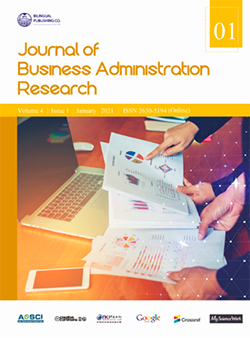An Analysis of the Business Climate and the Investment Intentions Trend in Post-revolutionary Tunisia
DOI:
https://doi.org/10.30564/jbar.v4i1.2600Abstract
The paper examined the impact of business climate on the investment intentions of local enterprises, Mediterranean enterprises, and individual entrepreneurs in Tunisia. The paper has used both primary and secondary data. The secondary data is used for literature review and primary data has been collected by survey in Tunisia. Primary data were collected from 257 local and 204 Mediterranean businesses, including Large Corporations, Small businesses and SMEs, and 362 individual Tunisian investors, using a structured questionnaire via face-to-face interviews. Principal Component Analysis, t-test, ANOVA, post-hoc test, and the model of Multinomial Logistic Regression Analysis has been carried out to study the interrelationships among the variables in this paper. A descriptive analysis of the data has also been done. The paper found that the most important economic variables for local and Mediterranean enterprises are the “presence of support system” and “Investment Grants”. Though for the Individual Investors the most important economic variables are “Saturation of Market”, “Investment grants”, and “Data Access”. The social variables “safety in daily activities, safety while traveling” and “security level of governance” are the most important variables. Further, the most important political variables affecting investment decisions are “Good governance” and “Law enforcement” of local, Mediterranean enterprises, and individual investors. The paper also found that political dimensions have a significant impact on the investment intentions of local enterprises, while social dimensions have a significant impact on the investment intentions of Mediterranean enterprises. Moreover, economic dimensions have a significant impact on the investment decision of individual investors. The paper suggests that, by developing a favorable climate for businesses, the government should promote investment in Tunisia. Easy credit facilities should be provided to the entrepreneurs. There is a need to provide credit guarantee tools to small and medium-sized businesses for easy access to financial services.
Keywords:
Investment Intentions; ANOVA; PCA; Business climate; EnterprisesReferences
[1] Alon, I., Herbert, T. T. A stranger in a strange land: Micro political risk and the multinational firm. Business Horizons, 2009, 52(2): 127-137.
[2] Bechri, Mohamed & Najah, Tijani, Nugent, Jeffrey B. Tunisia’s Lending Program to SMEs: Anatomy of an Institutional Failure? Small Business Economics, Springer, 2001,17(4): 293-308.
[3] EIB. Tunisia: Neighborhood SME financing. European Investment Bank, 2015.
[4] Franco, M., Haase, H., Lautenschläger, A. Students’ Entrepreneurial Intentions: An Inter-Regional Comparison. Education+Training, 2010, 52(4): 260-275.
[5] GEDI. Global Entrepreneurship and Development Institute-GEDI, 2017.
[6] Hamada J., Haugerudbraaten H., Hickman A., et Khaykin I. Country and Political Risk. Practical Insights for Global Finance, Sam Wilkin, Risk Books, 2004.
[7] ILO. Employment Policy Convention, 1964 (No. 122) - Tunisia (Ratification: 1966), 2016:
[8] https://www.ilo.org/dyn/normlex/en/f?p=NORMLEXPUB:13101:0::NO::P13101_COMMENT_ ID:3242582
[9] Mansouri,Faysal. Challenges in Accessing Finance for Growth-Oriented Small and Micro Entrepreneurs in Tunisia, 2011. Available at: http://www.oecd.org/mena/competitiveness/47252691.pdf
[10] Sequeira, J.M. Muller, S., McGee, J.E. The Influence of Social Ties and Self-efficacy in Forming Entrepreneurial intentions and Motivating Nascent Behavior. Journal of Developmental Entrepreneurship, 2007, 12(3): 275-293.
[11] U.S. Department of State. 2019 Investment Climate Statement Tunisia, 2019. Available at
[12] https://www.state.gov/reports/2019-investment-climate-statements/tunisia/
[13] World Bank. Investment Climate Assessment: Enterprises’ Perception in Post Revolution Tunisia. Washington, DC. © World Bank, 2014. https://openknowledge.worldbank.org/handle/10986/19323; License: CC BY 3.0 IGO.
[14] World Bank. The Regulatory Environment for Private Sector Investment, 2017. Available at:
[15] http://pubdocs.worldbank.org/en/413431500382259730/ the-unfinished-revolution-eng-chap4.pdf
[16] World Bank. Tunisia Innovative Startups and SMEs Project (P167380), 2019.
[17] Karasmanaki Evangelia et. Al. An Investigation of Factors Affecting the Willingness to Invest in Renewables among Environmental Students: A logistics Regression Approch, Sustainability, 2019.
[18] Cooray, A. Factors Affecting Investments and Business confidence with Special Regard to political Stability in Sri Lanka, 2003.
[19] Alleyene, Broome. An exploratory study of factors influencing investment decisions of potential investors, Central Bank of Barbados Working Paper, 2010.
[20] Yosra Mefteh Rekik, Younes Boujelbene. Determinants of Individual Investors’Behaviors: Evidence from Tunisian Stock Market. IOSR Journal of Business and Management (IOSR-JBM), 2013, 8(2): 109-119. E-ISSN: 2278-487X
Downloads
Issue
Article Type
License
Copyright and Licensing
The authors shall retain the copyright of their work but allow the Publisher to publish, copy, distribute, and convey the work.
Journal of Business Administration Research publishes accepted manuscripts under Creative Commons Attribution-NonCommercial 4.0 International License (CC BY-NC 4.0). Authors who submit their papers for publication by Journal of Business Administration Research agree to have the CC BY-NC 4.0 license applied to their work, and that anyone is allowed to reuse the article or part of it free of charge for non-commercial use. As long as you follow the license terms and original source is properly cited, anyone may copy, redistribute the material in any medium or format, remix, transform, and build upon the material.
License Policy for Reuse of Third-Party Materials
If a manuscript submitted to the journal contains the materials which are held in copyright by a third-party, authors are responsible for obtaining permissions from the copyright holder to reuse or republish any previously published figures, illustrations, charts, tables, photographs, and text excerpts, etc. When submitting a manuscript, official written proof of permission must be provided and clearly stated in the cover letter.
The editorial office of the journal has the right to reject/retract articles that reuse third-party materials without permission.
Journal Policies on Data Sharing
We encourage authors to share articles published in our journal to other data platforms, but only if it is noted that it has been published in this journal.




 Marouen Hadhri
Marouen Hadhri

